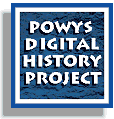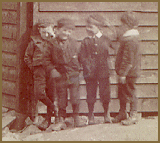
Education in Wales 4
1847-1870
The infamous "Blue Books"
In 1847 a commission (consisting of Anglican Englishmen) to look
into the state of Welsh education reported back, in what became
known as the "Treachery of the Blue Books". This was
a fairly damning indictment but also a very detailed one which
recognised the class and religious divides which hampered progress
in education in Wales. Unfortunately, it also made some severe
generalisations along racial and moral lines which outraged the
Nonconformists and led to a further alienation from Anglicanism.
By a Revised Code of Regulations, from 1862 the head teachers
of all schools receiving a grant were required to make a daily
entry in a School Log Book, an invaluable source reflecting the
life of a school.
The School Boards
By 1870 the British Society (i.e. Nonconformist) had
some 300 schools in Wales, but the National Society (i.e. Anglican)
had over 1,000. The Liberal government now tried to create a
comprehensive network of elementary schools in Wales, and also
attempted to get round the unwillingness of Anglicans and Nonconformists
to compromise over religion (which Peel had failed to do in 1843).
This was the Education Act of 1870, which provided for
a full education for lower-class children up to the age of 13.
Government grants would continue to British and National schools,
but where provision was inadequate, a School Board was to be
set up to build a Board school which would be funded by the rates.
The board was to determine whether or not there should be religious
education in its schools, but such education, if given, was not
to be denominational: however, under Clause 25 of the Act, the
boards were empowered to pay the fees of poor children attending
denominational schools.
The British schools were incorporated into the School Board
system, but the (Anglican) National and Roman Catholic schools
preferred to stay outside. This meant that they received no financial
assistance from the rates.
Controversially, no Board schools were set up where there was
sufficient National school provision, even if most of the children
in the area came from Nonconformist families. This was a source
of grievance to Nonconformists. On the other hand, about half
of the 320 Board schools in Wales opted for no religious teaching
at all.
There are 6 pages on the origins of education in Wales. Use the box links below to view the other pages.